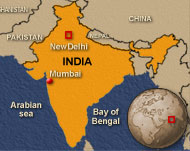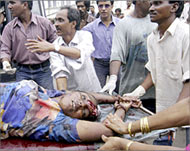A disunited nation wracked by turmoil
India has been racked by ethnic and religious conflict since independence from Britain in 1947.

The world’s largest secular democracy is predicted to be one of the political, economic and military superpowers of the 21st century.
But it is also a place where thousands have been slaughtered in regular outbreaks of religioius turmoil.
At least 44 people were killed on Monday after two car bombs exploded at a Hindu temple and tourist site in the heart of Mumbai.
So far no one has claimed responsibility for the blasts, but there is no shortage of suspects.
Ayodhya mosque
The blasts came minutes after archaeologists claimed they found the remains of a Hindu temple below the surface of a mosque razed by Hindu zealots in 1992.
Mumbai itself was the scene of bloody Hindu-Muslim riots following the 1992 demolition of the ancient Babri mosque in the northern Indian town of Ayodhya.
The financial heart of India was also rocked by a string of bombings in 1993 which left at least 300 people dead.
Hindus and Muslims are still disputing whether ruins found at India’s most controversial religious site are evidence of a Hindu temple.
The differences follow the release of a report compiled by a team of Indian Government archaeologists excavating at Ayodhya.
Controversial report
 |
|
Mumbai is the financial heart of |
The report says there is “archaeological evidence of a massive structure” below ground where the Babri mosque was demolished 11 years ago.
Hindu groups have expressed pleasure at the report’s findings and say it will strengthen their case to have a Hindu temple built at the site.
But Muslims say the report offers no proof the building was meant for Hindu worship, and have accused the archeologists of working under pressure from the hardline Hindu Bharatiya Janata Party.
The Ayodhya riots, which left 2000 people dead, were the precursor to a religious conflagration in Gujarat last year.
Riots broke out in February 2002 after 60 Hindu pilgrims were burned to death on a train.
Riots
About 2000 people died in the ensuing reprisals against Muslims, along with mass rapes of hundreds of women.
First reports alleged the train torching was carried out by a Muslim mob, but a subsequent report by forensic scientists proved inconclusive.
Respected human rights groups blamed the Hindu nationalist state government of Gujarat for orchestrating the violence.
Mumbai has also seen a spate of deadly bombings this year.
 |
|
Mumbai has been the scene of |
Last month four people were killed in a bombing during rush hour, and in March a bomb planted on a suburban train killed 11 people.
Kashmir conflict
Indian authorities were quick to point the finger for the attacks at Pakistani resistance group Lashker-e-Taiba.
Lashker is one of the two groups New Delhi blames for the December 2001 attack on its parliament which left 15 people dead.
The organisation is fighting to remove Indian forces from the Muslim-majority state of Kashmir.
The territory of Kashmir was hotly contested even before India and Pakistan won their independence from Britain in August 1947.
Since then it has been the flashpoint for two of the three India-Pakistan wars – the first in 1947-8, the second in 1965.
Grievances
And in 1999, India fought a brief but bitter conflict with Pakistani-backed forces who had infiltrated Indian-controlled territory in the Kargil area.
It is still too early to say for sure who is responsible for Monday’s Mumbai blasts.
It is also uncertain why India’s financial capital has been targeted.
But one thing is sure – the grievances which led the bombers to kill are plentiful and they are not going to go away soon.